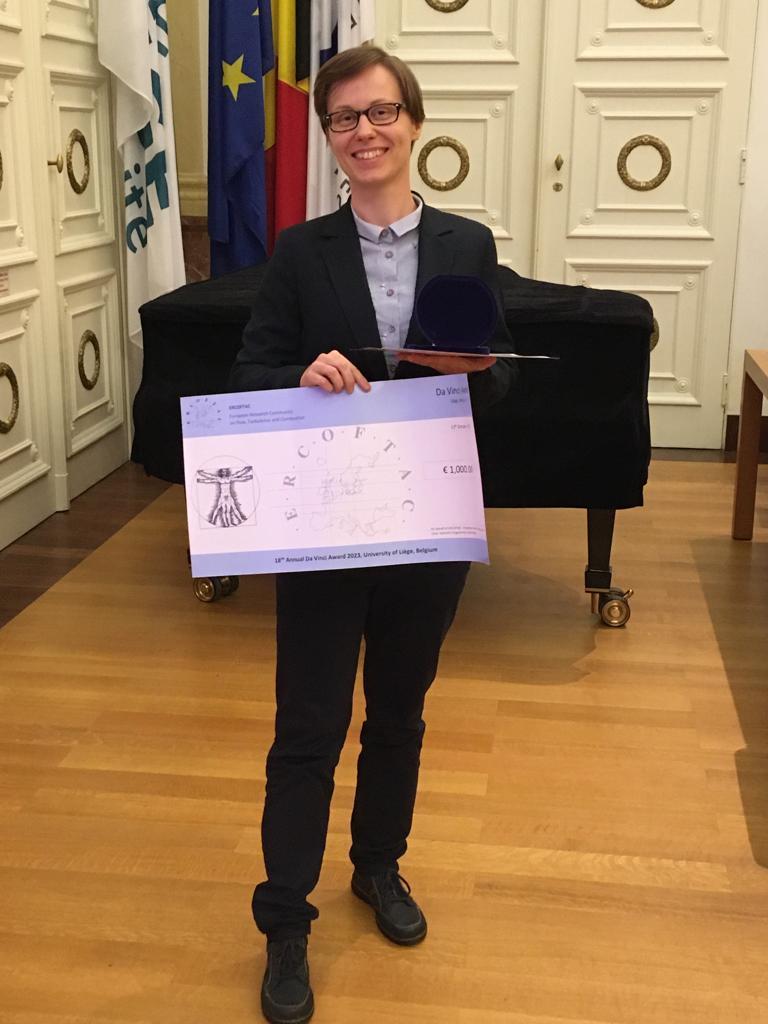18th ERCOFTAC Da Vinci Competition 2023 - Winner
Kamila Zdybał
(Université libre de Bruxelles, Belgium)
"Reduced-Order Modeling Of Turbulent Reacting Flows Using Data-Driven Approaches"

Kamila Zdybał - winner of
18th Da Vinci Competition 2023
- What is the topic of your PhD thesis?
In my Ph.D., I developed data-driven approaches to advance reduced-order models of turbulent combustion. My research has thus been at the nexus of multicomponent mass transfer, numerical simulation, and machine learning.
- What does the Da Vinci competition mean to you and what does winning mean
to you?
Winning the Da Vinci competition is a great honour. It is also a wonderful recognition from my advisor, Prof. Alessandro Parente, to nominate my Ph.D. work. It is also very satisfying to me personally, because my entrance into the world of fluid dynamics wasn’t very straightforward, having studied civil engineering for my undergraduate degree. I had to learn and get up to speed with the knowledge of fluid dynamics, combustion modeling, and machine learning on my own. Winning the Da Vinci prize gives me confidence that I have taken the right path through my learning experience!
- You're the first woman to win the Da Vinci prize. Could you share how you feel about this achievement?
I’m very honoured that I could be the first woman to win the Da Vinci prize. At the same time,
I believe that becoming a finalist in the Da Vinci competition is a testament to hard work, tenacity, and passion for research. All those are qualities that should be celebrated, irrespective of gender. Looking ahead, I hope that positive qualities in female and male researchers are equally recognized in academia. I have hopes that this will lead to more women entering the finals of the Da Vinci competition in the future.
- What did trigger your interest in STEM?
My parents were the first ones to foster my childhood interests in science by doing home experiments with me and explaining things about the world to me. I also had a wonderful mathematics teacher in junior high school and a wonderful physics teacher in high school, who both inspired me to pursue my own paths through anything that caught my interest. Today, what I appreciate the most about the great teachers that I had is that they encouraged me to follow my curiosities and keep learning and experimenting on my own without sticking too strictly to the school program.
- Do you have any advice for other women in STEM?
There might be times when you are discouraged by others from pursuing your goals. It is very unfortunate, but still very real. My advice is: Don’t let anyone or anything discourage you from pursuing your own path. Keep moving forward. Even if each step you take is tiny, when you accumulate all the steps over many years by being consistent, you will find that you can get very far on your own. If you can, find mentors who believe in you and will always have your back.
- What motivates you in your work?
I enjoy getting into the nitty-gritty details of my research and pursuing the loose ends until I learn something that my colleagues and I didn’t know before. I love getting those incremental insights along the way, especially when I can share them with someone I work with. The second thing that motivates me is leaving the output of my work out there for others to use and learn from. For example, when I write a journal article, I always imagine another Ph.D. student reading it, and I ask myself: What would I like the student to learn from my work? Then I try to shape the manuscript in such a way that it’s useful for a graduate student. Being helpful to the research community is what motivates me enormously.
- Where do you see yourself in five years?
I had two wonderful mentors during my Ph.D., Prof. Alessandro Parente and Prof. James C. Sutherland, and I’m hoping that I can someday pass on the great things that they taught me to the next generation of students! By now, I also can’t imagine myself doing anything other than research! Currently, I’m a postdoctoral researcher at Empa in Switzerland, working on machine learning for experimental fluid dynamics. I’m hoping that I can one day become a professor. That will help me combine those two aspirations: mentoring and doing research.
- What advice would you give to new PhD students starting in fluid mechanics?
Fluid dynamics is such a rich world that there’s enough learning and discoveries for a lifetime. And that’s a great thing! Be brave enough to follow your curiosities when you learn new things.
Da Vinci Presentation available here
Paper summary
Date: ERCOFTAC Autumn Festival 2023, 12th - 13th October 2023 |
